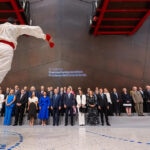BBVA’s Frontiers Awards recognize the value of science in guiding decision-making in the face of humanity's greatest challenges
Carlos Torres Vila defended the power of knowledge as “the best instrument we have to understand the world” and to face “major disruptions” such as the global environmental crisis, during the award ceremony of the 15th BBVA Foundation Frontiers of Knowledge Awards.

Science and culture are “essential cornerstones” to guide decision-making and find solutions to the great challenges facing humanity, said the BBVA Foundation President, who stressed that humanity must urgently address such complex challenges as “the seriousness of climate change and the loss of biodiversity, both of which are probably among the greatest disruptions in history” and therefore “more than ever we must make a firm commitment to knowledge and innovation.”
During the ceremony held at the Euskalduna Conference Center in Bilbao, which honored the contributions of 18 world leaders in scientific research and artistic creation, Carlos Torres Vila noted how the Frontiers of Knowledge Awards “have been established as an indicator of scientific and cultural excellence on a global scale" which reflect "the map of knowledge of the 21st century.” Through these awards, “we have been able to cooperate, year after year, in making the decisive role of research and creation more visible,” a fundamental objective because “knowledge is the best instrument we have to understand the world and ourselves, and to take advantage of our societies' opportunities, both future and present.”
“In the midst of the climate and energy crisis, post-pandemic, and with the return of populism,” the work of the award winners has contributed in a fundamental way “to solving collective challenges, such as the fight against disease, the conservation of biodiversity and the stability of democracy,” agreed the president of the Spanish National Research Council (CSIC), Eloísa del Pino, who presided, together with Carlos Torres Vila, over a ceremony in which the president of the Basque Government, Íñigo Urkullu, and the mayor of Bilbao, Juan Mari Aburto, also took part.
All the winners of the 15th Edition of the Frontiers of Knowledge Awards
This year's prizewinners include scientists who are using artificial intelligence and attosecond physics to develop new treatments or facilitate early diagnosis of diseases, researchers who have shown that the speed of climate change today is unprecedented in history and those who have given us a better understanding of animal behavior, not to forget engineers whose work has made possible the development of today's electronic devices. In the field of Social Sciences, several of the awardees have contributed to shaping the field of modern political economy or have spurred us on to further progress.
- Basic Sciences: Anne L’Huillier, Paul Corkum y Ferenc Krausz.
- Biology Biomedicine: David Baker, Demis Hassabis y John Jumper.
- Information and Communication Technologies: Alberto Sangiovanni Vincentelli.
- Ecology and Conservation Biology: Susan Alberts, Jeanne Altmann y Marlene Zuk.
- Climate Change: James Zachos y Ellen Thomas.
- Economics, Finance and Business Management: Timothy Besley, Torsten Persson y Guido Tabellini.
- Humanities and Social Sciences: Steven Pinker y Peter Singer.
- Music and Opera: Thomas Adès.
21 Frontiers prizewinners went on to receive Nobel Prizes
An external indicator of the excellence of the Frontiers of Knowledge Awards is that 21 of the researchers recognized by the BBVA Foundation awards subsequently received the Nobel Prize.
- Ten Frontiers prizewinners have subsequently won the Nobel Prize in Economics: Lars Peter Hansen (2013), Jean Tirole (2014), Angus Deaton (2015), William Nordhaus (2018), Abhijit Banerjee and Esther Duflo (2019), Paul Milgrom and Robert Wilson (2020), David Card (2021), and Ben Bernanke (2022).
- In the case of the Nobel Prize in Medicine, four Frontiers prizewinners have subsequently won the award from the Swedish Academy: Shinya Yamanaka (2011), James P. Allison (2018), and David Julius and Ardem Patapoutian (2021)
- Four Frontiers prizewinners have subsequently won the Nobel Prize in Economics: Didier Queloz and Michel G. E. Mayor (2019); Klaus Hasselman and Syukuru Manabe (2021).
- Finally, in the case of the Nobel Prize in Chemistry, three Frontiers prizewinners have subsequently received this award: Robert J. Lefkowitz, in 2012, and Emmanuelle Charpentier and Jennifer Doudna, in 2020.